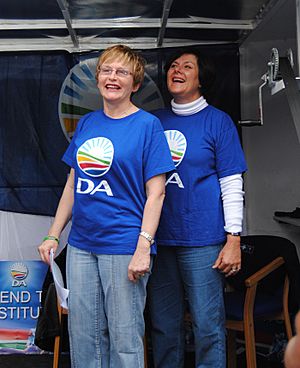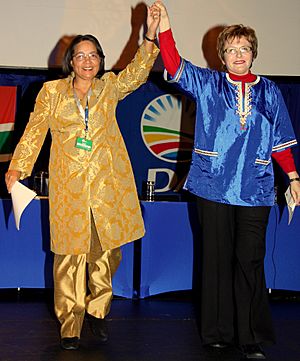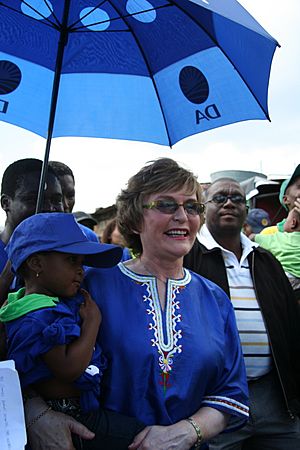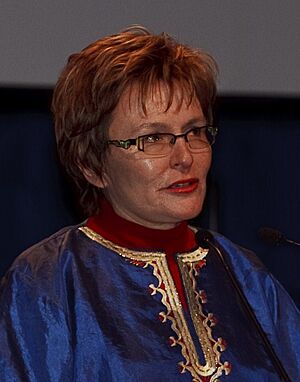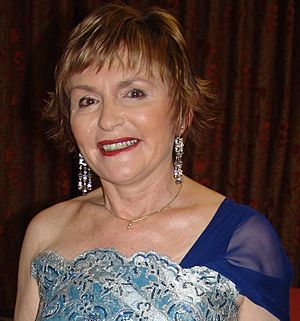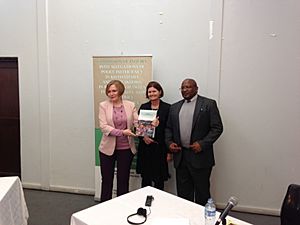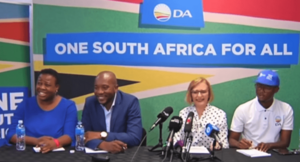Helen Zille facts for kids
Quick facts for kids
Helen Zille
|
|
|---|---|
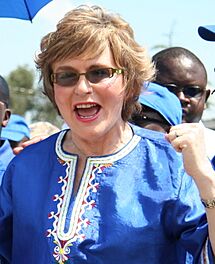
Zille visiting Mpumalanga in January 2011
|
|
| Chairperson of the Federal Council of the Democratic Alliance | |
| Assumed office 20 October 2019 |
|
| Deputy | Annelie Lotriet Thomas Walters James Masango Ashor Sarupen |
| Leader | John Steenhuisen Mmusi Maimane |
| Preceded by | James Selfe |
| Federal Leader of the Democratic Alliance | |
| In office 6 May 2007 – 10 May 2015 |
|
| Preceded by | Tony Leon |
| Succeeded by | Mmusi Maimane |
| 7th Premier of the Western Cape | |
| In office 6 May 2009 – 22 May 2019 |
|
| Preceded by | Lynne Brown |
| Succeeded by | Alan Winde |
| Mayor of Cape Town | |
| In office 15 March 2006 – 30 April 2009 |
|
| Deputy | Grant Haskin |
| Preceded by | Nomaindia Mfeketo |
| Succeeded by | Grant Haskin (acting) Dan Plato |
| Member of the National Assembly of South Africa | |
| In office 14 April 2004 – 15 March 2006 |
|
| Constituency | Western Cape |
| Member of the Western Cape Provincial Parliament | |
| In office 6 May 2009 – 7 May 2019 |
|
| Director of Communications and Public Relations at the University of Cape Town | |
| In office 15 June 1999 – 13 April 2004 |
|
| Personal details | |
| Born |
Otta Helene Zille
9 March 1951 Johannesburg, Transvaal, South Africa |
| Political party | Democratic Alliance (2000–present) |
| Other political affiliations |
Democratic Party (before 2000) |
| Spouse |
Johann Maree
(m. 1982) |
| Children | 2 |
| Residences | Cape Town, Western Cape, South Africa |
| Alma mater | St Mary's School, Waverley University of the Witwatersrand |
| Occupation |
|
| Profession | Journalist |
Otta Helene Maree (born 9 March 1951), known as Helen Zille, is a South African politician. She has been the Chairperson of the Federal Council of the Democratic Alliance since October 20, 2019.
Before this, she was the Premier of the Western Cape province for two five-year terms, from 2009 to 2019. She also served as the Federal Leader of the Democratic Alliance from 2007 to 2015. From 2006 to 2009, she was the Mayor of Cape Town.
Helen Zille was also a journalist and an activist who worked against apartheid. She helped to reveal important information about the death of activist Steve Biko in the 1970s. She has worked in all three levels of government in South Africa.
In 2008, Zille was chosen as the World Mayor of the Year. She also speaks English, Afrikaans, Xhosa, and German.
Contents
Helen Zille's Early Life
Growing Up and School
Helen Zille was born in Hillbrow, Johannesburg. Her parents left Germany in the 1930s to escape persecution because her maternal grandfather and paternal grandmother were Jewish.
Zille went to St Mary's School, Waverley in Johannesburg. She then studied at the University of the Witwatersrand, where she earned a Bachelor of Arts degree. Around 1969, she joined the Young Progressives, a youth group that was against apartheid.
A Journalist for Change
Zille started her career as a political reporter for the Rand Daily Mail newspaper in 1974. In September 1977, a government minister said that anti-apartheid activist Steve Biko had died in prison after a hunger strike.
Zille and her editor, Allister Sparks, believed this was not the full story. Zille found proof by talking to the doctors involved. After their story was published, the minister threatened to ban the newspaper. Zille also received threats.
Later, an investigation confirmed that Biko's death was due to a serious head injury. Zille left the Rand Daily Mail when the newspaper's owner wanted them to stop writing about equal rights.
Fighting for Fairness
In the 1980s, Zille was very involved in the Black Sash movement, which worked for human rights. She also helped lead the End Conscription Campaign in the Western Cape. During this time, she was arrested for being in a "group area" without a permit.
Zille and her husband even offered their home as a safe place for political activists during a difficult time in 1986. She also helped gather information for a commission that looked into efforts to cause problems in the Western Cape before the 1994 elections.
Working in Education
In 1989, Zille started a company that advised on public policy. In 1993, she became the Director of Development and Public Affairs at the University of Cape Town.
She also led the governing body of Grove Primary School. In 1996, she successfully challenged a government rule that limited how schools could choose their staff.
In 1999, the Democratic Party (now the Democratic Alliance) asked her to help write a plan for education in the Western Cape. She then became a Member of the Western Cape Provincial Legislature and was appointed as the MEC for Education.
In 2004, Zille became a Member of Parliament for the DA. She became a deputy leader and spoke for the party on education matters.
Becoming Mayor of Cape Town
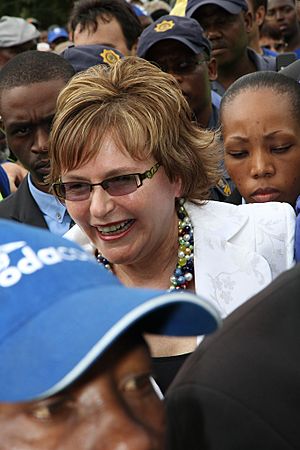
Winning the Mayoral Election
In the 2006 local elections, the DA became the biggest party in Cape Town. Helen Zille was elected mayor on March 15, 2006. She won with the support of several smaller parties.
As mayor, Zille's government decided to change the appointment of the city manager. This decision was supported by the High Court, which said the previous appointment was not lawful.
Zille faced challenges from the African National Congress (ANC). They wanted to change the city's mayoral system, which would have reduced the mayor's power. However, they reached an agreement to keep the current system.
Key Focus Areas as Mayor
As mayor, Zille focused on Cape Town's role as a host city for the 2010 World Cup. This included building the Cape Town Stadium, which hosted many football matches.
She also worked on community safety in Cape Town. She called for more support for rehabilitation centers and government funding to help communities. She met with local groups to discuss these efforts.
Zille also disagreed with plans to combine the metro police with the national police service. She argued that this would take power away from local government.
What She Achieved
Improving Homes and Services
While housing is usually handled by the provincial government, Zille said her city government worked to improve housing lists. This helped increase the number of homes built each year.
She also pointed out that her administration set aside a special budget in 2007 to provide water, electricity, and sanitation to informal settlements. This was a new step compared to previous administrations.
Leading the DA Party
Election as Leader
On March 15, 2007, Zille announced she would run to become the new leader of the DA. She was a strong candidate and was elected as the new leader on May 6, 2007. She continued to serve as the mayor of Cape Town while leading the party.
Important Topics as Leader
As the leader of the DA, Zille spoke out on several important topics.
Safety and Justice
Zille was concerned about safety in the country. She suggested increasing the size of the police force and hiring more detectives. She also proposed improving detention programs and using technology to help.
She said the DA's plan would include support for victims of crime.
Healthcare
Zille warned about a new law that would give the state more control over private healthcare. She believed it could cause many skilled medical professionals to leave the country. She and her party suggested a different plan that involved more private healthcare options.
Fair Justice System
Zille often questioned the independence of the justice system in South Africa. She spoke about concerns regarding judges and fairness.
Public Discussions
In June 2008, she invited the president of the ANC, Jacob Zuma, to a public discussion on important topics. However, Zuma did not participate.
Community Safety Efforts
In September 2007, Zille was arrested when she visited a police station to investigate the arrest of a group called PADLAC. This group was working to raise awareness about community safety in Cape Town. Police said she supported groups that were against certain activities.
Zille was later found not guilty of all charges. She said she would sue the police for wrongful arrest. In March 2008, Helen Zille led a protest march in Johannesburg to promote community safety.
United Nations Work
In April 2008, Zille was invited to speak at the United Nations in New York City. She shared her experiences and lessons as the mayor of Cape Town.
Zille supports the idea of a United Nations Parliamentary Assembly. She believes it would help people feel more connected to the UN.
World Mayor Award
In October 2008, Zille won the World Mayor Award. She was chosen from 820 mayors around the world.
Stepping Down as Party Leader
In April 2015, Zille announced that she would not seek re-election as the party leader.
Premier of the Western Cape
2009 Election and Becoming Premier
The 2009 general elections were Zille's first big election as the DA leader. She was chosen as the candidate for Premier of the Western Cape. Her party won 51.46 percent of the vote in the province.
Zille became the Premier, and Dan Plato took over as mayor of Cape Town. Nationally, the DA gained more support, becoming the official opposition party.
Land Discussions
In May 2009, Zille raised concerns about the transfer of provincial land in the Western Cape to a national body. She said the deal was done "secretly" and with a hidden purpose. The ANC said the land deal had been discussed publicly many times.
The issue was resolved in January 2010 when the Minister of Human Settlements agreed to return the land to the province.
2014 Elections and Re-election
Before the 2014 elections, a Thembu King joined the DA. Zille noted that the DA's rules meant his membership would end if his legal appeals failed. In October 2015, his convictions were upheld, and his membership ended.
After the 2014 general elections, the DA won 59.38% of the vote in the Western Cape. This meant they gained more seats in the provincial legislature. Zille was sworn in for her second term as Premier on May 26.
End of Her Term as Premier
In September 2018, the Democratic Alliance announced that Alan Winde would be their candidate for Western Cape Premier in the 2019 South African general election. Helen Zille could not run for a third term because the South African constitution limits a premier to two terms. She left office on May 22, 2019.
Later Career
Joining the SAIRR
After leaving public office in May 2019, Helen Zille joined the South African Institute of Race Relations (SAIRR) as a senior policy analyst in July 2019. The SAIRR said that Zille joining them brought together two strong voices for change in the country. She later paused her work with the SAIRR in October 2019.
Tea with Helen Podcast
Zille started her own podcast called Tea with Helen in August 2019. She wanted to talk with people who had different political views. The podcast is available on YouTube, iTunes, and Spotify. Her first guest was Peter Bruce, a former editor. Other guests have included Ferial Haffajee and Max du Preez.
Federal Council Chairperson
Zille was elected as Federal Council Chairperson of the DA in October 2019. This role is similar to a Secretary-General in the party. Zille announced she would run for the position because she felt the party was going through a difficult time. She was re-elected to this position in April 2023.
Considering Johannesburg Mayoral Race
In early June 2025, Zille announced she was thinking about running for Mayor of Johannesburg. She said she would make her decision public before June 15, 2025.
The Democratic Alliance (DA) has held the Joburg mayoral post before. Zille has expressed that she is not happy with how Johannesburg has been managed recently. She believes it would take more than five years to improve the city. She noted that Johannesburg has a large need for infrastructure improvements and a big workforce.
Zille believes she can be an effective Mayor of Johannesburg. She points to her experience as Mayor of Cape Town, where she helped improve the city around 2006. She also highlights her time as Premier of the Western Cape province.
Cape Town has been praised for its stable and responsible governance. The Auditor General of South Africa has called it the best-run large city in the country for three years in a row, as of 2025.
Zille stated that as Mayor, she would first focus on making Joburg's finances stable and improving services. She also said that having the right people in key roles in the Johannesburg City Council would be very important for the city's improvement.
She added that fixing Johannesburg would require everyone in society to work together. She hopes that residents will stay to help fix the city, and that those who have moved away will return to do the same.
Personal Life
Helen Zille married Professor Johann Maree in 1982. They have two sons. She is a member of the Rondebosch United Church in Cape Town.
Books by Helen Zille
- Zille, Helen (October 2016). Not Without a Fight. Penguin Books. ISBN 9781776090426
- Zille, Helen (April 2021). #StayWoke: Go Broke: Why South Africa won’t survive America’s culture wars (and what you can do about it). Independently Published. ISBN 9798727953457
See also
 In Spanish: Helen Zille para niños
In Spanish: Helen Zille para niños
 | Toni Morrison |
 | Barack Obama |
 | Martin Luther King Jr. |
 | Ralph Bunche |


